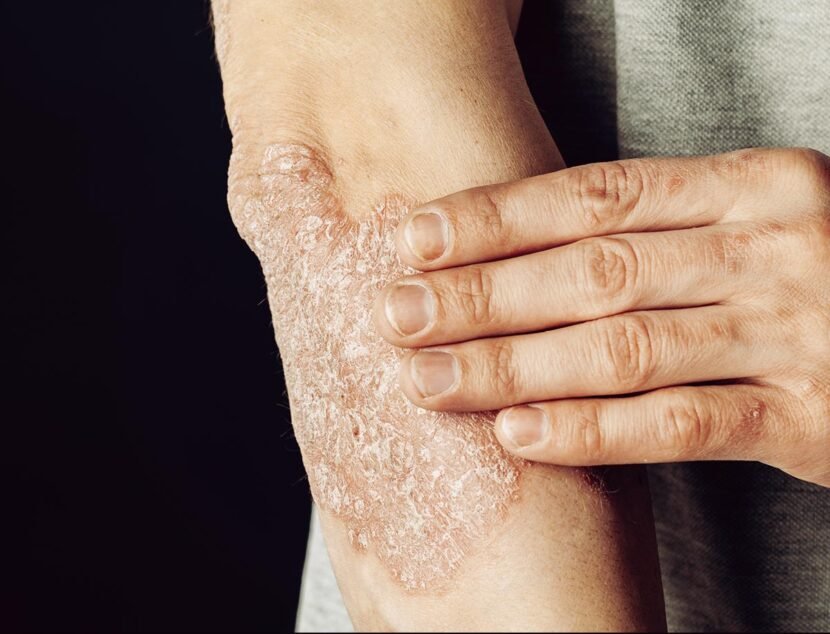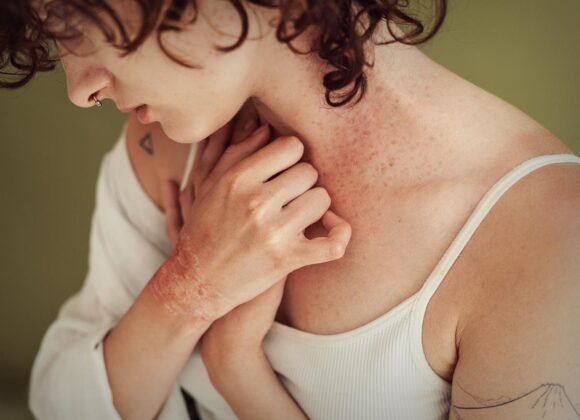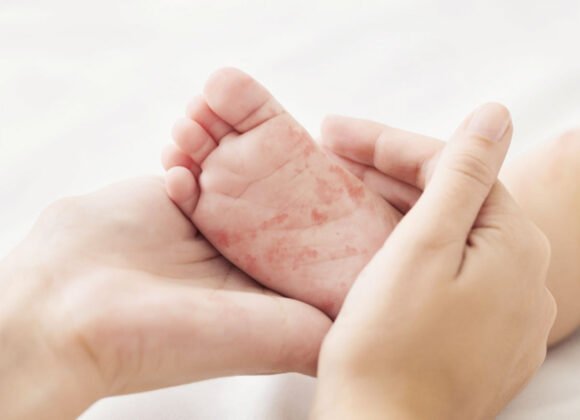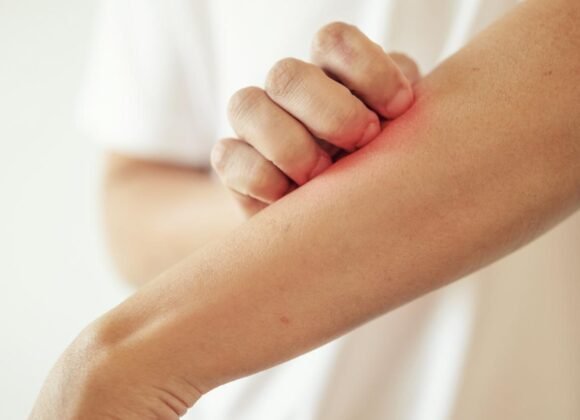Eczema, also known as atopic dermatitis, is a prevalent skin condition affecting millions globally. When it manifests on the elbows, it can cause significant discomfort and be visually noticeable. Early symptoms of elbow eczema typically include redness, dryness, and itching.
The affected skin may appear rough and scaly, with potential development of small, fluid-filled blisters. As the condition progresses, the elbow skin can become thickened and leathery, potentially cracking and bleeding in severe cases. The associated itching is often intense and persistent, leading to further irritation.
The impact of elbow eczema on quality of life can be substantial. Constant itching and discomfort may interfere with daily activities and sleep patterns, resulting in fatigue and irritability. The visible nature of elbow eczema can also cause self-consciousness and embarrassment, potentially affecting self-esteem and confidence.
Recognizing early symptoms is crucial for timely intervention and management of the condition. Early identification allows individuals to take proactive measures to address the issue and prevent its progression to a more severe or chronic state.
Key Takeaways
- Early symptoms of eczema on the elbows include dry, itchy, and inflamed skin
- Triggers for eczema on the elbows can include irritants, allergens, stress, and weather changes
- Treatment options for eczema on the elbows include moisturizing, using topical steroids, and avoiding triggers
- Tips for relieving discomfort and irritation from eczema on the elbows include taking short, lukewarm showers and wearing soft, breathable fabrics
- Prevention strategies for eczema flare-ups on the elbows include identifying and avoiding triggers, moisturizing regularly, and managing stress
- Lifestyle changes such as maintaining a healthy diet, staying hydrated, and managing stress can help manage eczema on the elbows
- Severe eczema symptoms on the elbows may require consultation with a doctor for proper diagnosis and treatment
Identifying the Triggers: What Causes Eczema on the Elbows?
Common Triggers of Eczema Flare-Ups
Certain triggers can exacerbate eczema symptoms on the elbows, leading to increased inflammation and discomfort. Common triggers include irritants such as harsh soaps, detergents, and chemicals, as well as allergens like pet dander, pollen, and dust mites. Additionally, changes in temperature and humidity levels can impact the skin’s barrier function, making it more susceptible to eczema flare-ups.
The Impact of Stress on Eczema
Stress is another significant trigger for eczema on the elbows. Emotional stress can weaken the immune system and increase inflammation in the body, leading to worsening of eczema symptoms. Furthermore, scratching the affected skin can further exacerbate the condition, leading to more inflammation and potential infection.
Managing Eczema on the Elbows
By minimizing exposure to irritants and allergens, practicing stress-reducing techniques, and maintaining a healthy skincare routine, individuals can reduce the frequency and severity of eczema flare-ups on their elbows. Identifying and avoiding these triggers is crucial for managing eczema on the elbows effectively.
Eczema Treatment Options for Elbows: How to Soothe and Heal the Skin
When it comes to treating eczema on the elbows, there are several options available to soothe and heal the skin. Moisturizing the affected area is essential for keeping the skin hydrated and preventing dryness and itching. Using emollients or ointments that are fragrance-free and specifically formulated for sensitive skin can help restore the skin’s natural barrier function.
In addition to moisturizing, topical corticosteroids may be prescribed by a healthcare professional to reduce inflammation and itching associated with eczema. These medications should be used as directed to avoid potential side effects such as thinning of the skin. For individuals with more severe eczema on their elbows, immunosuppressant medications or phototherapy (light therapy) may be recommended by a dermatologist.
These treatments work to modulate the immune system and reduce inflammation in the skin. It’s important to consult with a healthcare provider to determine the most appropriate treatment plan based on the severity of the condition. In some cases, oral antihistamines may be prescribed to help alleviate itching and improve sleep quality.
It’s crucial for individuals with eczema on their elbows to follow a comprehensive treatment plan that addresses both symptom relief and long-term management of the condition.
Managing Itchy Skin: Tips for Relieving Discomfort and Irritation
Managing itchy skin associated with eczema on the elbows can be challenging, but there are several strategies that can help relieve discomfort and irritation. One of the most important steps is to avoid scratching the affected area, as this can further damage the skin and lead to infection. Keeping fingernails short and wearing cotton gloves at night can help prevent unintentional scratching during sleep.
Applying cool compresses or taking a lukewarm bath with colloidal oatmeal or baking soda can provide relief from itching and soothe inflamed skin. In addition to these measures, practicing stress-reducing techniques such as meditation, deep breathing exercises, or yoga can help manage emotional stress that may exacerbate eczema symptoms. Wearing loose-fitting clothing made from soft, breathable fabrics like cotton can minimize friction and irritation on the elbows.
Using fragrance-free skincare products and laundry detergents can also help reduce potential triggers for eczema flare-ups. It’s important for individuals with eczema on their elbows to develop a personalized management plan that incorporates these strategies to effectively manage itching and discomfort associated with the condition.
Prevention Strategies: How to Avoid Eczema Flare-ups on the Elbows
Preventing eczema flare-ups on the elbows involves implementing proactive strategies to minimize exposure to triggers and maintain healthy skin. Avoiding harsh soaps, detergents, and cleaning products that can strip the skin of its natural oils is essential for preventing dryness and irritation. Using mild, fragrance-free skincare products that are specifically formulated for sensitive skin can help maintain the skin’s barrier function and reduce the risk of eczema flare-ups.
In addition, individuals with eczema should be mindful of their clothing choices, opting for loose-fitting garments made from soft fabrics like cotton to minimize friction on the elbows. Managing stress through relaxation techniques and seeking support from friends, family, or mental health professionals can also play a significant role in preventing eczema flare-ups. Creating a comfortable indoor environment with stable temperature and humidity levels can help minimize environmental triggers that may exacerbate eczema symptoms.
Regular moisturizing of the elbows with emollients or ointments can help keep the skin hydrated and reduce dryness and itching. By incorporating these prevention strategies into their daily routine, individuals with eczema on their elbows can minimize the frequency and severity of flare-ups.
Lifestyle Changes: Incorporating Healthy Habits to Manage Eczema on Elbows
Nutrition and Hydration
Eating a balanced diet rich in fruits, vegetables, lean proteins, and healthy fats can support overall skin health and reduce inflammation in the body. Staying hydrated by drinking an adequate amount of water each day can also help maintain skin moisture and elasticity.
Physical Activity and Sleep
Regular exercise can improve circulation and promote overall well-being, which may contribute to better management of eczema symptoms. In addition to these lifestyle changes, getting an adequate amount of sleep each night is crucial for supporting immune function and reducing stress levels.
Skincare and Lifestyle Choices
Establishing a consistent skincare routine that includes gentle cleansing and moisturizing can help maintain healthy skin barrier function. Avoiding smoking and excessive alcohol consumption is also important for minimizing inflammation in the body, which can exacerbate eczema symptoms. By making these lifestyle changes, individuals with eczema on their elbows can support their overall health and well-being while managing their condition effectively.
Seeking Professional Help: When to Consult a Doctor for Severe Eczema Symptoms
While mild cases of eczema on the elbows can often be managed with over-the-counter treatments and lifestyle modifications, it’s important to seek professional help when symptoms are severe or persistent. If over-the-counter moisturizers and corticosteroid creams do not provide relief or if symptoms worsen despite treatment, it’s essential to consult a healthcare provider for further evaluation. Additionally, if there are signs of infection such as increased redness, swelling, warmth, or oozing from the affected area, medical attention should be sought promptly.
A dermatologist can provide a comprehensive assessment of eczema symptoms on the elbows and recommend appropriate treatment options based on the severity of the condition. In some cases, prescription medications or advanced therapies such as phototherapy may be necessary to manage severe eczema symptoms effectively. Furthermore, if eczema significantly impacts a person’s quality of life, causing emotional distress or interfering with daily activities, seeking support from a mental health professional may be beneficial.
By consulting with healthcare providers when needed, individuals with severe eczema on their elbows can receive personalized care and support to manage their condition effectively.
FAQs
What is eczema?
Eczema, also known as atopic dermatitis, is a chronic skin condition that causes red, itchy, and inflamed patches of skin.
What are the early symptoms of eczema on elbows?
Early symptoms of eczema on elbows may include dry, itchy, and red patches of skin. The affected area may also become thickened and scaly over time.
How can eczema on elbows be prevented?
Eczema on elbows can be prevented by avoiding triggers such as harsh soaps, certain fabrics, and extreme temperatures. Keeping the skin well moisturized and using gentle skincare products can also help prevent flare-ups.
Is eczema on elbows a common condition?
Yes, eczema on elbows is a common condition, especially in individuals with a personal or family history of eczema, asthma, or allergies.
Can eczema on elbows be treated?
Yes, eczema on elbows can be treated with moisturizers, topical corticosteroids, and other prescription medications. It is important to consult a healthcare professional for proper diagnosis and treatment.




